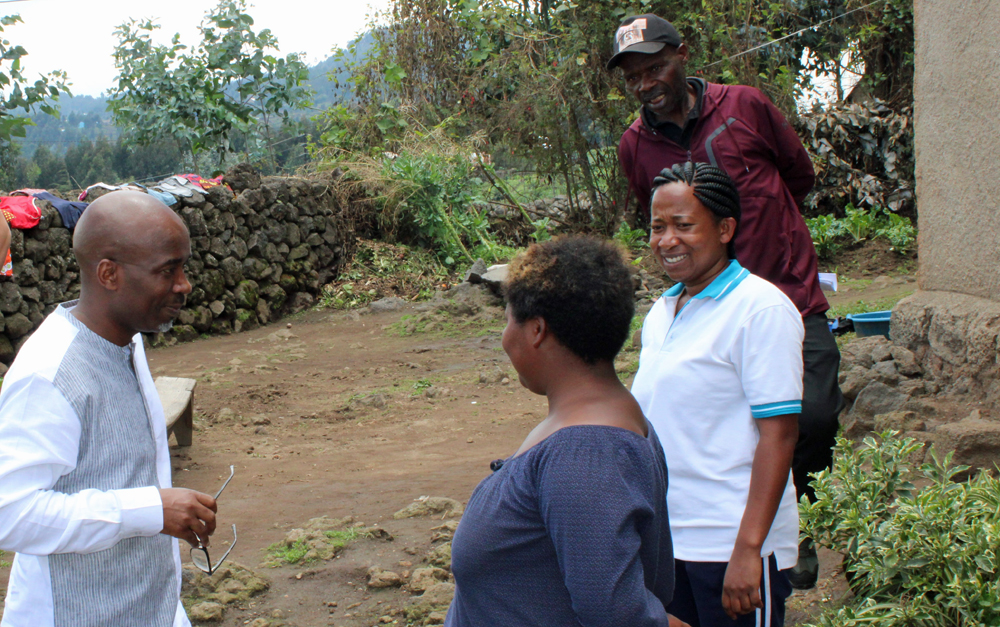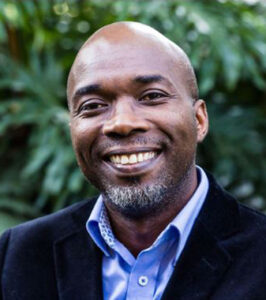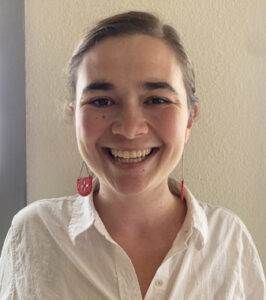For some Canton residents, USAID cuts hit close to home
By Candace Paris
Anatole Manzi of Canton joined by community health workers Damascene and Nicole during a home visit in rural Rwanda
Working with the Trump administration, Elon Musk and his Department of Government Efficiency (DOGE) staff have made significant cuts to funding and staffing of various government offices and agencies. Just four days after the inauguration, USAID was one of the first to come under the knife. The organization has been the primary administrator of civilian foreign aid, and the drastic cuts resulted in a near total freeze on American foreign aid around the world. More than 1,000 employees or contractors were fired or furloughed immediately, and over 80 percent of programs have since been cancelled.
While many will agree that some reductions of government spending are needed, the cuts to USAID have been heavily criticized as arbitrary, cruel and possibly illegal — as well as unwise policy insofar as they jeopardize the international image of the U.S. from the extreme haste with which they were put into effect. Some examples of what civilian foreign aid actually means reveal the losses brought about by those cuts.
Two Cantonites on the front lines of aid work have seen the actual harm done by the government’s sweeping actions. Dana Del Vecchio was fired after her employer, Boston-based Inclusive Development Partners (IDP), lost its contracts with USAID after the cuts. IDP is a consulting organization that works with agencies around the world to identify children with disabilities and make sure they are included in education programs.
Del Vecchio, who grew up in Canton, worked remotely for IDP in project management, applying her expertise in international development, education, and budgeting to programs in Morocco, Nigeria, and Malawi, to name a few. “What we’re doing actually helps people,” she said.
Most obviously, IDP helped disabled children in each country. Del Vecchio’s work supported their teachers and national education coordinators as well. She assisted Morocco’s minister of education in developing a new curriculum in middle school-level English and Science that would reflect the Universal Design for Learning principles that IDP promotes to optimize teaching and learning for all learners. Training for school staff was included in the project.
In Nigeria alone, about 200,000 children with disabilities are not even enrolled in school. Del Vecchio’s research would guide schools in identifying students and collecting data on their disabilities (something previously not done at all), as well as suggesting low-tech solutions, often the only kind feasible, such as providing a visually impaired child with a magnifying glass.
The project in Malawi aimed to get at least 30 percent of early grade children, including those with disabilities, reading in Chichewa, the Bantu language spoken in the country.
Del Vecchio said that she had only one and a half weeks after the stop work order to wrap everything up. “It was a shock; I was very stressed,” she said.
She noted that international development projects take time to get started and then generally last about five years. Stopping in the middle means the work is not completed, resulting in a huge waste of resources and time. Even worse is the human cost. Some contractors never got paid for December or January; local people Del Vecchio worked closely with are now unemployed and at risk of poverty; and some schools will close.
Concerning the possibility of future work with IDP, Del Vecchio said, “I would love to return, but is there any hope?” With her skills and interests, she has options for future work, but she worries about her former colleagues and their families and the effect on the national economies from the education losses in the countries IDP served.
Anatole Manzi, a native of Rwanda, is a public health expert specializing in global health who works for Boston-based Partners in Health. He is also associated with other organizations, including Harvard Medical School and Move Up Global, a small nonprofit in Rwanda specializing in education and public health which he founded. His perspective on the threats to health that are already apparent from the cuts to USAID is informed by a deep knowledge of healthcare systems and on-the-ground experience.
Manzi said that the most noticeable effect is the rise in malaria cases. Since malaria is the top killer in sub-Saharan Africa and hits children especially hard, the need for unrelenting mosquito control and a constant supply and use of insecticide-treated bed nets is critical. Even a single day’s halt of malaria control and prevention efforts will have consequences one to two weeks down the road. “Already 30 percent of seasonal mitigation efforts are off track,” Manzi said.
There is also a surge of new HIV and tuberculosis infections with the closing of clinic doors and the resulting breakdown of the system for detecting and treating these chronic diseases. But Manzi said the picture for HIV and TB will become much worse in about six months. “The future is really worrisome,” he said.
With supply chains slowing or collapsing, patients won’t always be able to take their daily medication. Manzi said that stopping and starting the medications is likely to cause drug resistance. While alternative drugs exist, they are very expensive and it’s difficult for poor countries to provide them.
Manzi also worries about loss of ability to collect and share data. This is very risky since good data is especially critical with acute diseases like Ebola and COVID that can rapidly infect people and create a pandemic. Data collection and sharing presents a more accurate picture, enabling healthcare workers to respond quickly by increasing outreach efforts or adjusting treatment approaches, helping to limit spread.
Besides increased death rates and likely medical facility closures, Manzi foresees a loss of trust in clinics and hospitals, leading to still more deaths, especially in maternal mortality. “We will have a system unable to provide care,” he said. Even if funding is somehow suddenly restored, the losses so far could mean lasting damage.
While his fears dominate, Manzi is careful to note that some countries have already experienced transformations from services funded by USAID. Remembering the deaths in Rwanda from HIV before people had access to medication, he said, “I am so grateful.” He noted that some countries are more resilient and will find ways to innovate, perhaps including regional collaboration. He also finds comfort in the support he has received both in the past and present from Canton residents. He wishes that more people felt the moral implications of interdependence with other human beings.
USAID was formed in 1961 and has funded programs in nutrition, disaster relief, socioeconomic development, environmental protection, and democratic governance and education, besides education and medicine. With a history of bipartisan support, its funds are authorized by Congress and amount to less than 1 percent of the federal budget.
Short URL: https://www.thecantoncitizen.com/?p=131634












